Losing a limb changes life in ways that go beyond the physical. The emotional and mental adjustments that come with an amputation can be just as challenging as the physical ones. Feelings of frustration, self-doubt, or even isolation are common. But one of the most powerful ways to overcome these challenges is through sports.
Engaging in sports is more than just staying active—it’s about reclaiming independence, rebuilding confidence, and rediscovering joy. The psychological benefits of sports for amputees are profound, helping individuals regain control over their bodies and minds. Whether it’s running, swimming, cycling, or playing a team sport, the impact of movement on mental health is undeniable.
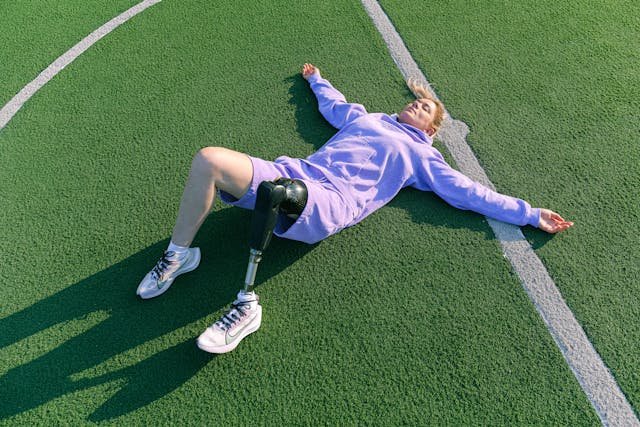
Rebuilding Confidence Through Movement
Amputation can leave a person feeling disconnected from their body. Simple movements that once felt effortless may now seem challenging, leading to frustration or even self-doubt. But sports help change that.
The act of moving—running, swimming, lifting, or even just stretching—rebuilds confidence by proving that the body is still strong, capable, and adaptable.
For many amputees, the first step into sports is often the hardest. Fear of failure or uncertainty about how the prosthetic will function can create hesitation. However, with time and practice, these fears fade as the body learns to trust itself again.
Every small improvement—a longer run, a stronger push, a more balanced stance—reinforces a sense of achievement. These victories, no matter how small, translate into greater self-confidence in everyday life.
Sports also shift the focus from what was lost to what is possible. Instead of dwelling on limitations, athletes with limb loss begin to see new strengths.
They discover that with the right prosthetic, proper training, and determination, they can achieve things they never thought possible.
This mindset carries over into other areas of life, making everyday tasks feel more manageable and reinforcing the belief that nothing is out of reach.
The Power of Goal Setting and Achievement
Setting and reaching goals is one of the most effective ways to boost self-esteem. Sports provide a structured way to set clear, measurable goals—whether it’s improving endurance, mastering a new skill, or competing at a higher level.
For amputees, these goals become powerful motivators, helping them push past mental and physical barriers.
The beauty of sports is that progress is visible. A runner might start by walking short distances before moving on to jogging. A swimmer may begin with simple floating exercises before building strength to complete laps.
Each achievement, no matter how small, builds momentum and reinforces the idea that effort leads to progress.
Training for sports also instills discipline and a sense of purpose. Having a daily routine, setting milestones, and tracking improvements create a structured approach to self-improvement.
This discipline extends beyond athletics, making it easier to approach life’s other challenges with the same mindset.
Overcoming Mental Barriers and Self-Doubt
One of the biggest challenges for amputees is overcoming the psychological barriers that come with limb loss. Thoughts like “I can’t do this” or “I’ll never be the same again” can become overwhelming. Sports help break these thought patterns by providing proof that adaptation is possible.
When an amputee successfully lifts weights, cycles up a hill, or hits a game-winning shot, it rewires the brain’s perception of capability.
Doubts turn into determination, and past fears are replaced with the confidence to try new things. The feeling of accomplishment gained from sports is powerful enough to shift a person’s entire outlook on life.
Failure is a natural part of sports, but it teaches resilience. Every missed shot, slow lap, or challenging workout is an opportunity to improve.
Amputees who engage in sports quickly learn that setbacks are temporary and that perseverance leads to progress. This lesson applies to all aspects of life, from career ambitions to personal relationships.
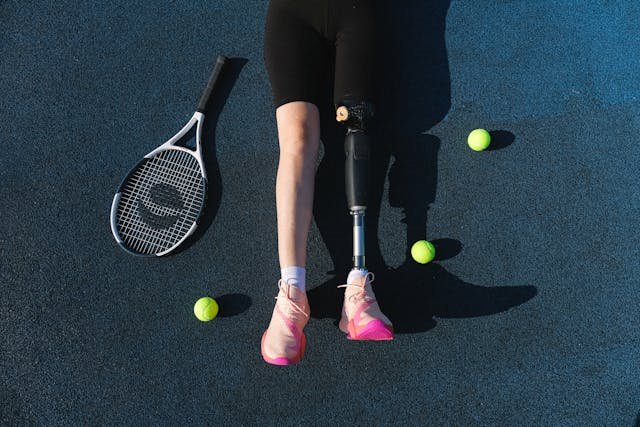
Building Emotional Resilience Through Sports
Sports are not just about physical strength; they are a powerful tool for developing emotional resilience. For amputees, adapting to life with a prosthetic or adjusting to mobility challenges can bring emotional ups and downs.
Engaging in sports helps manage these feelings by providing a positive outlet for frustration, stress, and anxiety.
When an amputee takes part in physical activity, the brain releases endorphins, often called “feel-good hormones.” These chemicals reduce stress, combat feelings of depression, and promote an overall sense of well-being.
The simple act of moving—whether it’s running on a track, swimming in open water, or lifting weights—can shift focus away from negative emotions and toward personal growth.
Sports also offer a sense of control. After an amputation, it’s common to feel like life is no longer within one’s control. But through training, skill-building, and perseverance, sports allow amputees to regain mastery over their bodies.
The more they train, the stronger and more capable they feel, creating a sense of empowerment that carries over into daily life.
The Role of Sports in Coping with Trauma
Losing a limb is a major life event that can be accompanied by emotional trauma. The journey toward healing is different for everyone, but sports can play a significant role in recovery.
Adaptive sports programs, which are designed for athletes with disabilities, provide structured environments where amputees can regain confidence while working through emotional challenges.
Participation in sports helps redirect focus from loss to possibility. Instead of viewing the body as broken or incomplete, sports highlight what it can still accomplish. Each movement, each game, and each competition becomes a reminder that life is still full of potential.
Athletes who have lost limbs due to accidents, illness, or military service often find that sports provide a therapeutic release.
The physical effort required in training serves as a healthy outlet for emotional struggles, allowing them to process grief, frustration, or anger in a constructive way.
Many adaptive athletes report that pushing their physical limits in sports helped them emotionally come to terms with their amputation.
The Connection Between Physical Activity and Mental Clarity
Beyond emotional healing, sports have been proven to enhance mental clarity. The focus required to perform well in sports—whether it’s strategizing in a game, maintaining balance on a prosthetic, or improving reaction times—sharpens the mind.
Regular physical activity improves cognitive function, helping amputees feel more alert, motivated, and mentally strong.
This mental sharpness extends beyond the field or gym. Studies have shown that athletes experience better problem-solving skills, increased patience, and improved concentration in other areas of life.
For an amputee, this means greater confidence in handling day-to-day challenges, from navigating new environments to returning to work or social activities.
Creating a Positive Identity Through Sports
For many amputees, their limb loss can initially feel like the defining feature of their identity. Sports help shift that narrative. Instead of being seen—or seeing themselves—as someone with a disability, they become athletes, competitors, and achievers.
Engaging in sports allows amputees to build a new identity based on strength, perseverance, and skill. Whether playing on a team or competing individually, they gain recognition for their ability, not their limitations.
This shift in identity fosters self-acceptance and pride, making them more confident in all aspects of life.
At Robobionics, we believe in the power of sports to transform lives. Our prosthetic solutions are designed to help amputees perform at their best, whether they’re engaging in recreational activities or competing professionally.
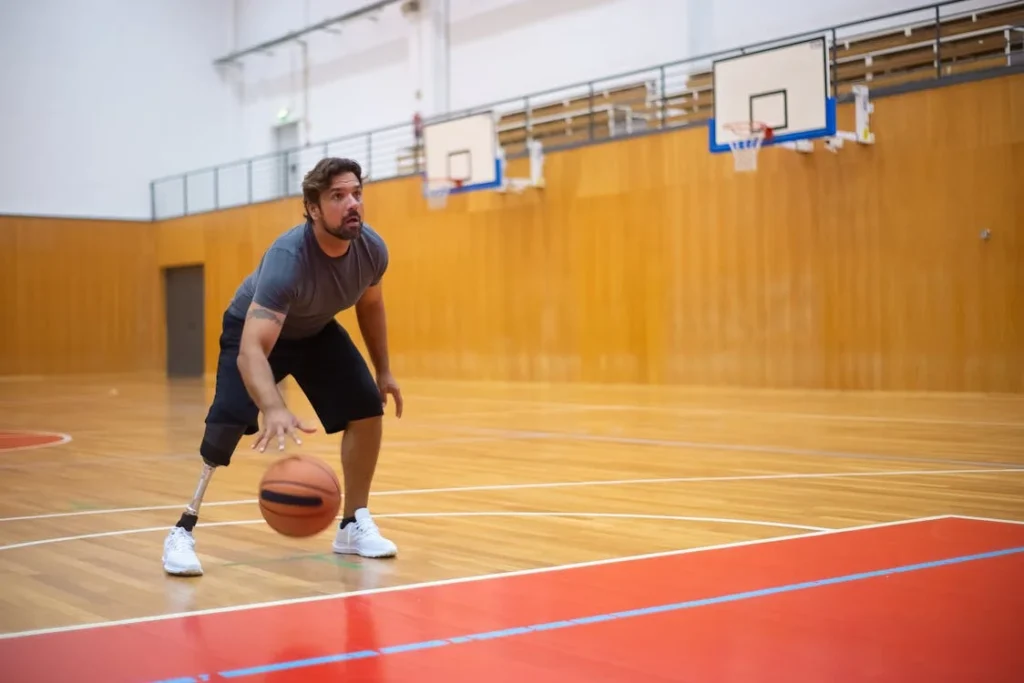
The Social Impact of Sports for Amputees
Sports are more than just physical activity—they are a gateway to connection. For many amputees, the experience of limb loss can feel isolating, making it harder to engage in social activities or feel a sense of belonging.
Sports create opportunities to reconnect with others, build friendships, and become part of a supportive community.
Breaking Social Barriers and Reducing Stigma
One of the biggest psychological challenges for amputees is overcoming the feeling of being different. In some cases, society’s perception of disability can create unnecessary barriers, making individuals feel like they don’t belong in sports or active environments.
But as more amputees step into sports, these perceptions are changing.
Adaptive sports are bringing more visibility to athletes with limb loss, proving that ability is not defined by physical differences.
Seeing amputee athletes compete, perform, and excel in sports helps shift public attitudes, reducing stigma and increasing inclusivity. This change in perception empowers more amputees to try sports without fear of judgment or exclusion.
Finding a Community of Support
Loneliness can be a major struggle for amputees, especially in the early stages of recovery. Joining a sports team, participating in adaptive sports leagues, or training with other athletes creates a sense of belonging.
The camaraderie built through sports goes beyond the game itself—it forms lifelong friendships and support systems.
Many amputees find that connecting with others who have gone through similar experiences helps them feel understood and accepted.
Sharing training tips, overcoming challenges together, and celebrating victories—big or small—creates a network of support that extends beyond the sport.
For those who feel hesitant about starting sports, seeing other amputees thrive in athletic environments can be incredibly inspiring. It proves that they are not alone in their journey and that there is a place for them in sports, no matter their level of experience.
Boosting Communication and Leadership Skills
Sports naturally develop communication skills, teamwork, and leadership qualities—factors that contribute to confidence and success in life. Playing in a team requires coordination, trust, and verbal or non-verbal communication with teammates.
These interactions help amputees strengthen their ability to express themselves, work with others, and build meaningful connections.
For those involved in competitive sports, the drive to improve performance often translates into leadership qualities.
Many amputee athletes go on to become mentors, coaches, or advocates for adaptive sports, helping to inspire the next generation of athletes with limb loss. Their stories encourage others to push past doubts, proving that amputation does not limit the potential for success.
Competing and Achieving Recognition
For those who take sports beyond recreation and into competition, the sense of accomplishment is even greater.
Many amputees go on to compete in local, national, and international sports events, from marathons and triathlons to Paralympic games. Competing at this level provides a new sense of purpose, proving that they can not only participate but also excel.
Winning a race, completing a challenging event, or simply outperforming personal bests gives amputees a renewed sense of achievement.
Recognition from teammates, family, and the broader sports community reinforces self-worth, proving that their abilities go far beyond their limb loss.
At Robobionics, we are committed to empowering amputees through innovative prosthetic solutions designed for both everyday movement and high-performance sports.
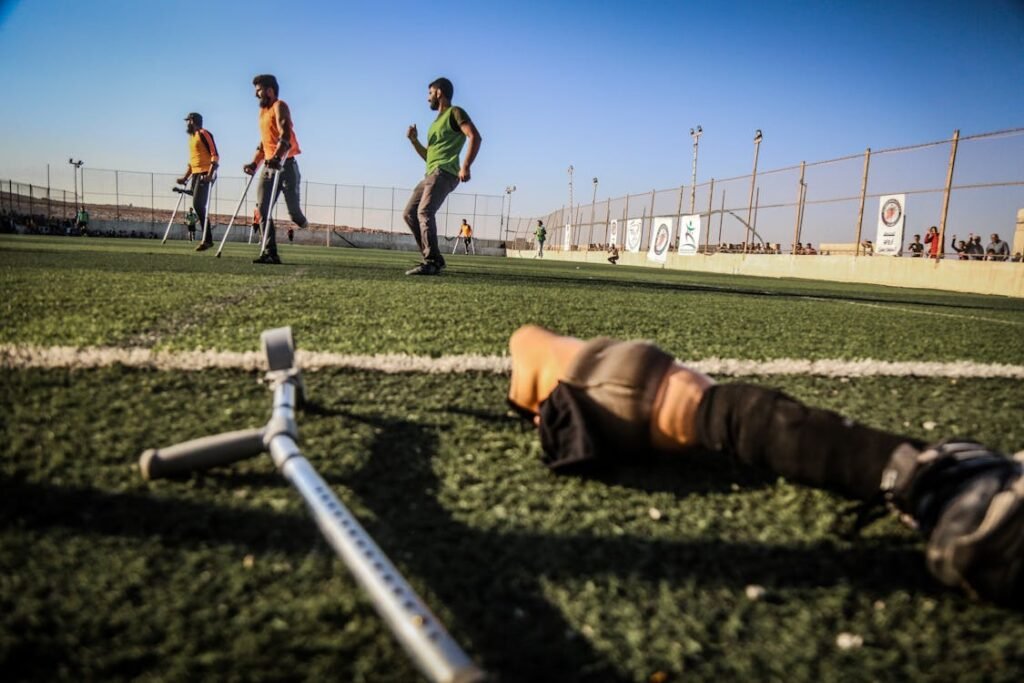
The Role of Adaptive Sports in Expanding Opportunities for Amputees
Adaptive sports are changing the way the world views athletes with limb loss. No longer limited by outdated perceptions, amputees now have access to specialized training, advanced prosthetics, and competitive opportunities that allow them to perform at their highest potential.
These sports are not just a form of rehabilitation—they are a platform for empowerment, personal growth, and proving that ability is not defined by physical limitations.
How Adaptive Sports Are Redefining Athletic Performance
The rise of adaptive sports has pushed the boundaries of what amputees can achieve. Thanks to specialized prosthetic technology, athletes with limb loss are competing at levels that were once considered impossible.
Running blades provide incredible energy return, adaptive cycling prosthetics allow for high-speed performance, and microprocessor-controlled knees offer better stability for complex movements.
More importantly, adaptive sports challenge the notion that physical disability is a barrier to competitive excellence.
Events like the Paralympics, Invictus Games, and adaptive marathons showcase athletes who have overcome adversity to become world-class competitors.
Their achievements inspire not only other amputees but also the broader athletic community, breaking down misconceptions about disability and sports.
The Psychological Strength Gained from Competition
Competing in sports is about more than just winning—it’s about proving to yourself that you are capable of more than you ever thought possible.
For amputees, participating in competitions provides an opportunity to test limits, push through mental barriers, and build resilience. The journey from training to competing teaches discipline, perseverance, and the value of hard work.
Competition also introduces goal-setting at a higher level. Instead of just focusing on basic movement, amputee athletes train with specific targets in mind—whether it’s improving their running time, increasing their strength, or perfecting a technique.
Working toward these goals builds self-confidence and strengthens mental resilience, which extends into everyday life.
Athletes who compete in adaptive sports often find that they develop a new sense of identity—not as someone with a disability, but as a competitor, an achiever, and an inspiration to others.
This shift in self-perception has a lasting impact, encouraging athletes to take on new challenges beyond sports as well.
Expanding Access to Adaptive Sports
One of the most significant changes in recent years has been the increased availability of adaptive sports programs. More organizations, schools, and communities are providing inclusive training environments where amputees can learn and grow as athletes.
Many non-profits and sports foundations now offer scholarships and grants for amputees looking to participate in sports.
This financial support removes barriers that may have once made adaptive sports inaccessible, ensuring that more individuals can benefit from the physical and psychological rewards of athletic participation.
Public awareness is also playing a role in expanding access. As more people see amputee athletes competing on television, in international events, and in local races, interest in adaptive sports continues to grow.
This increased visibility encourages more investment in facilities, coaching, and prosthetic advancements that further improve opportunities for athletes with limb loss.
The Future of Adaptive Sports and Amputee Athletes
The future of sports for amputees is brighter than ever. Innovations in prosthetic technology continue to improve, making movement more fluid and natural.
More adaptive sports leagues are being established worldwide, giving athletes greater chances to compete and connect with others.
And as society continues to embrace inclusivity in sports, the next generation of amputee athletes will have more opportunities to pursue their dreams.
At Robobionics, we are committed to supporting amputees in their athletic journey. Our advanced prosthetic solutions are designed to help you perform at your best, whether you’re training for competition or simply looking to stay active.

The Role of Technology in Enhancing Sports for Amputees
Advancements in prosthetic technology have revolutionized the way amputees engage in sports. Today’s prosthetic limbs are not just about mobility—they are high-performance tools designed to enhance speed, balance, and control.
The combination of cutting-edge engineering, biomechanics, and smart technology has opened new possibilities for athletes with limb loss, allowing them to compete on equal footing with able-bodied athletes in many cases.
High-Performance Prosthetics for Different Sports
Different sports require different types of prosthetics, each tailored to meet the specific demands of movement and impact.
For runners, carbon fiber blades provide incredible energy return, allowing for explosive power with each stride. These blades absorb impact and release stored energy, making them ideal for sprinting or long-distance running.
Unlike traditional prosthetics, which focus on stability, running blades are curved to mimic the spring-like motion of tendons and muscles.
Cyclists benefit from customized prosthetic legs with rotational capabilities, allowing them to efficiently transfer power to the pedals. Advanced knee joints with microprocessors adjust resistance based on cycling cadence, helping maintain a natural rhythm.
Swimmers use water-resistant prosthetic limbs with hydrodynamic designs, reducing drag and enhancing propulsion. Some models allow for increased flexibility in the ankle and knee, making leg movements in the water smoother and more efficient.
For weightlifters and adaptive CrossFit athletes, prosthetic arms with reinforced grip strength help stabilize movements and maximize lifting power. Some feature adjustable locking mechanisms to ensure safety during heavy lifts.
The Role of Smart Prosthetics in Sports
The introduction of microprocessor-controlled prosthetics has been a game-changer for amputee athletes. These smart prosthetics use sensors and artificial intelligence (AI) algorithms to analyze movement in real time, adjusting the prosthetic’s response accordingly.
For instance, a microprocessor knee can detect whether an athlete is walking, running, or jumping and adjust resistance levels to maintain stability. This allows for smoother transitions and reduces the risk of falling.
Upper-limb prosthetics with myoelectric control allow athletes to manipulate objects using muscle signals from their residual limb. This technology is particularly useful in sports like rock climbing, archery, and adaptive weightlifting, where precise grip control is essential.
Some of the latest innovations include smart feedback systems, where prosthetic limbs send sensory signals back to the nervous system.
This groundbreaking technology allows athletes to feel a sense of touch and pressure through their prosthetic, significantly improving coordination and responsiveness.
Customizing Prosthetics for Maximum Performance
Athletes often require highly customized prosthetics to meet the specific demands of their sport. Customization can involve:
- Fine-tuning the socket fit to prevent discomfort and enhance energy efficiency.
- Adjusting limb length and alignment to improve biomechanics and reduce strain on the body.
- Using different suspension systems (such as vacuum seals or pin-lock mechanisms) to ensure stability during high-impact movements.
- Modifying the weight distribution to optimize speed and agility.
Every athlete has unique needs, and working with an experienced prosthetist helps create a prosthetic that maximizes comfort and performance. Regular adjustments ensure that as an athlete improves their technique, their prosthetic continues to support their progress.
The Future of Sports Prosthetics
The next wave of innovation in sports prosthetics includes bionic limbs with real-time adaptability, 3D-printed prosthetics for personalized fit, and AI-driven systems that predict movement patterns to optimize performance.
As research continues, the gap between biological limbs and prosthetics will continue to narrow. Athletes with limb loss will gain even greater control, comfort, and efficiency, allowing them to push boundaries further than ever before.
At Robobionics, we stay at the forefront of prosthetic advancements to provide amputees with the best technology for sports and active lifestyles. If you’re looking for a prosthetic designed for high performance, contact us today to explore our customized solutions.
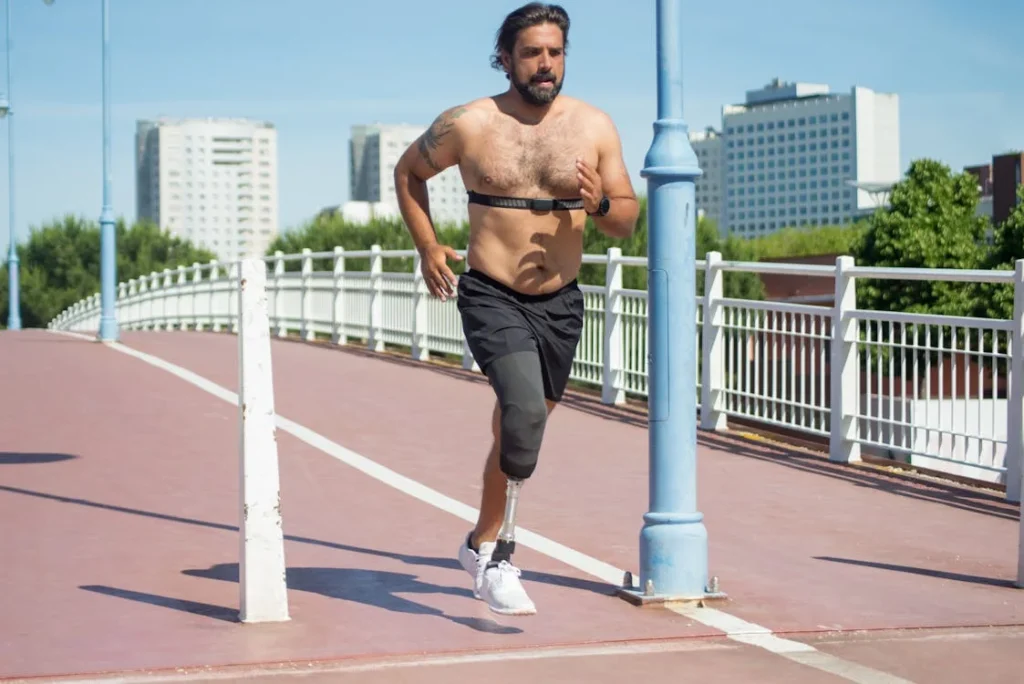
Inspiring Success Stories: Amputees Who Have Redefined Sports
The power of sports for amputees is best demonstrated through the stories of athletes who have broken barriers, shattered expectations, and proved that limb loss does not mean the end of an active life.
These individuals have not only excelled in their respective sports but have also inspired countless others to pursue their athletic dreams.
Markus Rehm: The Blade Jumper
Markus Rehm is one of the most dominant figures in Paralympic track and field. A below-knee amputee, Rehm competes in the long jump using a carbon fiber blade, and his performances have challenged traditional views of what athletes with prosthetics can achieve.
In 2014, he stunned the sports world by out-jumping able-bodied competitors, sparking discussions about the capabilities of prosthetic technology in athletics.
Rehm’s journey proves that adaptation, training, and cutting-edge prosthetic design can allow amputees to compete at elite levels. His success has helped open doors for further discussions about inclusivity in mainstream sports.
Amy Purdy: From Snowboarding to Dancing
Amy Purdy, a double-leg amputee, has made history in multiple arenas. She lost both legs to meningitis at the age of 19, but instead of letting that define her, she pushed forward and became a Paralympic snowboarder, motivational speaker, and even a finalist on Dancing with the Stars.
Purdy’s success highlights the importance of mental resilience and adaptability. She helped pioneer advanced snowboard prosthetics that allow for better flexibility, balance, and control, making snowboarding more accessible for athletes with limb loss.
Her story proves that sports are not just about physical ability—they are about determination, creativity, and pushing past limitations.
Tatyana McFadden: The Queen of Wheelchair Racing
Born with spina bifida and adopted from a Russian orphanage, Tatyana McFadden became one of the most decorated wheelchair racers in history.
She has won multiple Paralympic gold medals, marathon titles, and world championships, proving that adaptive sports can be just as competitive and thrilling as any other form of athletics.
McFadden’s story is a testament to hard work, discipline, and the power of inclusive sports programs.
Her impact has extended beyond racing—she has been a strong advocate for equal opportunities for athletes with disabilities, helping to shape policies that improve access to adaptive sports worldwide.
Hugh Herr: Redefining Prosthetic Engineering
While not a competitive athlete, Hugh Herr is a name that has changed the world of sports for amputees. A double-leg amputee, Herr is a leading biomechanical engineer who has designed some of the most advanced prosthetic limbs in history.
His work has helped athletes regain mobility and perform at levels that once seemed impossible.
Through his research at MIT, Herr has pioneered bionic limb technology, creating prosthetics that adapt in real-time to movement, terrain, and force.
His work ensures that future generations of amputee athletes will have access to even more natural, responsive, and high-performance prosthetic solutions.
How These Stories Shape the Future
The success of these athletes proves that limb loss does not have to be a barrier to achievement. Through innovation, determination, and access to the right prosthetic technology, amputees continue to push the boundaries of human performance.
Their stories inspire others to take the first step into sports, regardless of their physical condition. More importantly, they highlight the importance of representation, showing that amputee athletes deserve recognition, support, and opportunities on the global stage.
At Robobionics, we are committed to providing cutting-edge prosthetics that help amputees pursue their athletic dreams. Whether you want to train recreationally or compete at the highest level, our solutions are designed to maximize your potential.
Conclusion
Sports have the power to transform the lives of amputees, offering not just physical benefits but also emotional resilience, confidence, and a renewed sense of identity. Through movement, goal-setting, and competition, athletes with limb loss prove that ability is not defined by physical limitations but by determination and perseverance.
Engaging in sports helps amputees rebuild confidence, break through mental barriers, and find a supportive community. With advancements in prosthetic technology, adaptive training programs, and growing recognition in mainstream athletics, the opportunities for amputee athletes continue to expand. From Paralympic champions to first-time runners, every person who steps into sports takes a step toward self-empowerment.
At Robobionics, we are committed to making high-performance prosthetics accessible to those who refuse to let limb loss hold them back. Whether you’re looking to run, swim, cycle, or compete at the highest level, we provide the tools to help you reach your goals. If you’re ready to embrace the power of sports, contact us today and discover how the right prosthetic can help you unlock your full potential.



